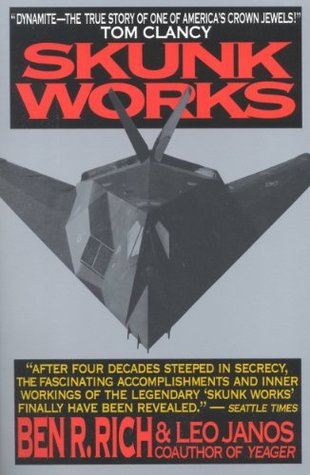More on this book
Community
Kindle Notes & Highlights
by
Ben R. Rich
Read between
February 17 - June 2, 2021
“Don’t try to ape me,” Kelly had advised me. “Don’t try to take credit for the airplanes I built. Go build your own. And don’t build an airplane you don’t really believe in. Don’t prostitute yourself or the reputation of the Skunk Works. Do what’s right by sticking to your convictions and you’ll do okay.”
Our senior shop people were tough, experienced SOBs and not shy about confronting a designer on a particular drawing and letting him know why it wouldn’t work. Our designers spent at least a third of their day right on the shop floor; at the same time, there were usually two or three shop workers up in the design room conferring on a particular problem. That was how we kept everybody involved and integrated on a project. My weights man talked to my structures man, and my structures man talked to my designer, and my designer conferred with my flight test guy, and they all sat two feet apart,
...more
In most companies quality control reported to the head of the shop. At the Skunk Works quality control reported directly to me. They were a check and balance on the work of the shop. Our inspectors stayed right on the floor with the machinists and fabricators, and quality control inspections occurred almost daily, instead of once, at the end of a procedure. Constant inspection forced our workers to be supercritical of their work before passing it on.
Self-checking was a Skunk Works concept now in wide use in Japanese industry and called by them Total Quality Management.
The rule of thumb in the aerospace business was the more you build, the better you get at it. Our view was that efficiency was mostly the result of quality training, careful inspection, supervision, and high worker motivation.
Before I really got to work, Boehme handed me a piece of paper on which was mimeoed Kelly’s “riot act”—ten basic rules we worked by. A few of them: “There shall be only one object: to get a good airplane built on time.” “Engineers shall always work within a stone’s throw of the airplane being built.” “Any cause for delay shall be immediately reported to C. L. Johnson in writing by the person anticipating the delay.” “Special parts or materials shall be avoided whenever possible. Parts from stock shall be used even at the expense of added weight. Otherwise the chances of delay are too great.”
...more
Kelly surrounded himself only with the kind of can-do guys that made American aerospace technology preeminent. To him, the word “impossible” was a gross insult.
Having today’s high-speed computers would have accelerated the design process and simplified much of our testing, but perfection was seldom a Skunk Works goal. If we were off in our calculations by a pound or a degree, it didn’t particularly concern us. We aimed to achieve a Chevrolet’s functional reliability rather than a Mercedes’s supposed perfection.
Eighty percent efficiency would get the job done, so why strain resources and bust deadlines to achieve that extra 20 percent, which would cost as much as 50 percent more in overtime and delays and have little real impact on the overall performance of the aircraft itself?
Viewed from head-on the ship looked like Darth Vader’s helmet. Some Navy brass who saw her clenched their teeth in disgust at the sight of the most futuristic ship ever to ply the seas. A future commander resented having only a four-man crew to boss around on a ship that was so secret that the Navy could not even admit it existed. Our stealth ship might be able to blast out of the sky a sizable Soviet attack force, but in terms of an officer’s future status and promotion prospects, it was about as glamorous as commanding a tugboat. At the highest levels, the Navy brass was equally
...more
You don’t need Harvard to teach you that it’s more important to listen than to talk. You can get straight A’s from all your Harvard profs, but you’ll never make the grade unless you are decisive: even a timely wrong decision is better than no decision. The final thing you’ll need to know is don’t half-heartedly wound problems—kill them dead. That’s all there is to it. Now you can run this goddam place. Now, go on home and pour yourself a drink.”
The open secret in our business was that the government practiced a very obvious form of paternalistic socialism to make certain that its principal weapons suppliers stayed solvent and maintained a skilled workforce.
By its very definition as a low-overhead, advanced development operation for crash production of hot items—prototypes representing cutting-edge technologies that the customer eagerly needs or wants to exploit—the Skunk Works is needed more than ever. The beauty of a prototype is that it can be evaluated and its uses clarified before costly investments for large numbers are made.
Extremely difficult but specific objectives (e.g., a spy plane flying at 85,000 feet with a range of 6,000 miles) and the freedom to take risks—and fail—define the heart of a Skunk Works operation. That means hiring generalists who are more open to nonconventional approaches than narrow specialists.


